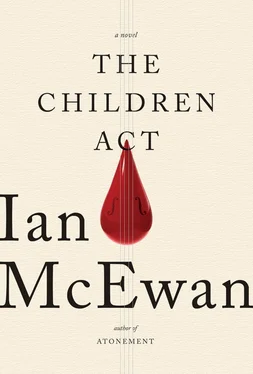The work of the Family Division went on. It was an accident of the listings that so much marital conflict came Fiona’s way. Pure coincidence that she was in conflict herself. It was not usual in this line of work to be sending people to prison, but all the same, she thought in idle moments that she could send down all those parties wanting, at the expense of their children, a younger wife, a richer or less boring husband, a different suburb, fresh sex, fresh love, a new worldview, a nice new start before it was too late. Mere pursuit of pleasure. Moral kitsch. Her own childlessness and the situation with Jack shaped these daydreams and, of course, she was not serious. Still, she buried deep in a private mental domain, but never let it affect her decisions, a puritan contempt for the men and women who pulled their families apart and persuaded themselves they were acting selflessly for the best. In this thought experiment, she wouldn’t have spared the childless, or at least, not Jack. A cleansing spell in the Scrubs for contaminating their marriage in the cause of novelty? Why not?
For life at home in Gray’s Inn since his return was quiet and strained. There had been rows, during which she discharged some bitter feelings. Twelve hours later those feelings were renewed as ardently as wedding vows, and nothing changed, the air was not “cleared.” She remained betrayed. He spiced his apologies with old complaints that she had isolated him, that she was cold. He even said late one night that she was “no fun” and had “lost the art of play.” Of all his accusations, these bothered her most because she sensed their truth, but they did not diminish her anger.
At least he was no longer saying he loved her. Their most recent exchange, ten days ago, reiterated all they had said before, every charge, every response, every brooded-over well-turned phrase, and in a short while they fell back, weary with each other and themselves. Since then, nothing. They moved about their days, their separate business in different parts of the city, and when confined together in the apartment stepped daintily around each other, like dancers at a hoedown. They were terse and competitively polite when obliged to confer on household matters, avoided meals together, worked in separate rooms, each distracted by raw awareness through the walls of the other’s radioactive presence. Without discussing it, they ducked out of all joint invitations. Her only conciliatory move was to give him a new key.
She inferred from his evasive but morose remarks that in the statistician’s bedroom he had not passed through the gates of paradise. Not really so reassuring. He was likely to try his luck elsewhere, was trying it already perhaps, freed this time from the dismal constraints of honesty. His “geology lectures” may have been a useful cover. She remembered her promise to leave him if he went ahead with Melanie. But Fiona didn’t have the time to set in motion such a gross disentanglement. And she was still undecided, she didn’t trust her current mood. If he had given her more time after he left, she would have reached a clear decision and worked constructively to end the marriage or rebuild it. So she abandoned herself to work in the usual way and set herself to survive a day at a time the subdued drama of her half-life with Jack.
When one of his nieces dropped off her children for the weekend, identical twin girls aged eight, matters became easier, the apartment grew larger as attention turned outward. For two nights Jack slept on the sofa in the sitting room, which the children never questioned. These were girls of a straight-backed old-fashioned sort, solemn and intimate in their manner, though not above the occasional explosive row. One or the other—they were easy to tell apart—would seek Fiona out where she was reading, and stand before her, resting a confiding hand on her knee, and release a silvery stream of anecdote, reflection, fantasy. Fiona would join in with stories of her own. Twice on this visit it happened that while she was speaking, a wave of love for the child constricted her throat and pricked her eyes. She was feeling old and foolish. It bothered her to be reminded how good Jack was with children. At the risk of putting his back out, the way he did once with Fiona’s brother’s three boys, he indulged some wild horseplay, which the girls took to with fits of inhuman shrieking. At home, their resentfully divorced mother never tossed them in the air upside down. He took them into the gardens to teach them an eccentric version of cricket he’d devised, and he read a long bedtime tale with booming comic energy and a talent for the voices.
But on Sunday evening, after the twins had been picked up, the rooms shrank back, the air was stale and Jack went out without explanation—surely a hostile act. To an assignation? she wondered as she made herself busy, tidying the spare room to keep her spirits from lowering further. Restoring the soft toys to the wicker basket where they lived, retrieving glass beads and discarded drawings from under the bed, she felt the mild enveloping sorrow, a form of instant nostalgia, that the sudden absence of children can bring on. That feeling lingered into Monday morning and swelled into a general sadness that followed her on the walk to work. It only began to fade when she sat at her desk to prepare for her first case of the week.
At some point, Nigel Pauling must have brought in the post, for the pile was suddenly there at her elbow. At the sight of an undersized pale blue envelope resting on top, she almost called her clerk back to open it. She was in no mood to read for herself one more outpouring of illiterate abuse or a threat of violence. She turned back to her work, but couldn’t concentrate. The impractical envelope, loopy hand, absent postcode, the postage stamp slightly awry—she’d seen too much of it. But when she looked again and noticed the postmark she had a sudden suspicion, weighed the letter in her hand a moment and opened it. Instantly, she saw from the salutation that she was right. She had vaguely expected it for weeks. She’d spoken to Marina Greene and learned that he was making good progress, out of hospital, catching up on schoolwork at home, and expected back in his classroom within weeks.
Three pale blue pages, with writing on five sides. The first had a circled number seven centered at the top, above the date.
My Lady!
This is my seventh and I think it’s going to be the one that I post.
The first several words of the next paragraph were scored out.
It will be the simplest and the shortest. I only want to describe to you one event. I realize now how important it is. It’s changed everything. I’m glad I waited because I wouldn’t like you to see the other letters. Too embarrassing! But not as terrible as all the names I called you when Donna came and told me your decision. I was sure you’d seen things my way. In fact I know exactly what you told me, that it was obvious that I knew my own mind, and I remember thanking you. I was still raging and ranting when that awful consultant, Mr. “call-me-Rodney” Carter, came in with half a dozen others and the equipment. They thought they were going to have to hold me down. But I was too feeble for that, and even though I was furious, I knew what you wanted me to do. So I held out my arm and they got started. The thought of someone else’s blood going into mine was so disgusting that I was sick right across the bed.
But that isn’t the one thing I wanted to tell you. It’s this. My mum couldn’t bear to watch so she was sitting outside my room and I could hear her crying and I felt really sad. I don’t know when my dad turned up. I think I passed out for a while and when I came round they were both there by my bed—and they were both crying and I felt even sadder, for all of us for disobeying God. But this is the important thing—it took me a moment to realize that they were crying for JOY! They were so so happy, hugging me, and hugging each other and praising God and sobbing. I was feeling too weird and I didn’t work it out for a day or two. I didn’t even think about it. Then I did. Have your cake and eat it! I never understood that saying before, now I do. Your cake is still in your hand even though you’ve just eaten it. My parents followed the teachings and they obeyed the elders and did everything that was right and can expect to be admitted to the earthly paradise—and at the same time they can have me alive without any of us being disassociated. Transfused, but not our fault! Blame the judge, blame the godless system, blame what we sometimes call “the world.” What a relief! We’ve still got our son even though we said he must die. Our son the cake!
Читать дальше












